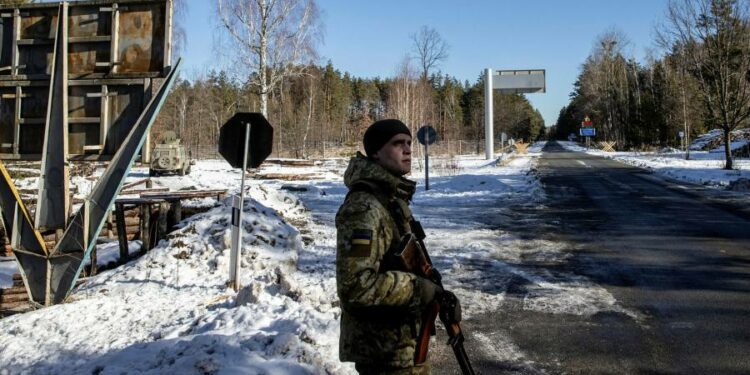European stocks wavered on Wednesday as traders weighed developments on the Russia-Ukraine border and the prospect of monetary policy tightening to tackle persistently high global inflation.
The Stoxx 600 index moved between small gains and losses, recently trading down 0.1 per cent. The regional gauge had closed 1.4 per cent higher in the previous session. London’s FTSE 100 lost 0.4 per cent, while Germany’s Dax shed 0.1 per cent. France’s blue-chip Cac 40 stock index fell 0.1 per cent.
Western security alliance Nato warned on Wednesday that Russian troop numbers continued to rise near the Ukraine border.
On Tuesday, Russian president Vladimir Putin had eased tensions by saying that Moscow was drawing down some troops from border areas to enable “dialogue” with the west. US president Joe Biden later told a White House briefing that there was still “plenty of room for diplomacy” to resolve the crisis. But Biden also noted that Russia had massed about 150,000 troops along the Ukrainian border and remained “very much in a threatening position”.
Jens Stoltenberg, Nato secretary-general, said on Wednesday: “We have not seen any de-escalation.”
Futures contracts tracking Wall Street’s S&P 500 index lost 0.2 per cent, while those tracking the tech-heavy Nasdaq 100 were also down about 0.2 per cent.
US and European equities had rallied in the previous session as oil prices fell. Yet Mike Zigmont, head of trading and research at Harvest Volatility Management, said the bullish case for equities would be “a tough one to argue” once investors turned their attention away from Ukraine and back to the US Federal Reserve.
The next meeting of the US central bank’s Federal Open Market Committee is scheduled for mid-March, with economists expecting interest rate increases to tackle inflation, which in January rose at its fastest annual pace since 1982.
“Investors should be ready for that kind of a policy change,” Zigmont said in a note. “I feel like they are not, however, and they will need to adjust as we approach the announcement.”
Roger Lee, head of UK equity strategy at Investec, questioned the extent to which markets had ever priced in a war in Europe. “We would have seen a far bigger flight to safety” if investors believed an invasion was truly imminent, he said.
Recent market ructions have instead been driven by valuation adjustments ahead of the Fed’s meeting next month, Lee said. “We know rates are going higher, but we don’t know how high or how quickly and that is what markets are struggling with,” he added.
Fund managers polled by Bank of America between February 4 and 11 had said they were more concerned about a recession, stock market bubbles, inflation and the Fed than they were about the situation in Ukraine.
In government debt markets, the yield on the 10-year US Treasury note ticked 0.01 percentage point lower to 2.03 per cent. The yield on German’s equivalent Bund fell 0.02 percentage points to 0.29 per cent.
Bond yields move inversely to their prices. Government bonds are often viewed as haven assets during periods of geopolitical uncertainty.
In the UK, fresh data on Wednesday showed that inflation had accelerated to its fastest rate in three decades. Consumer prices rose at an annual pace of 5.5 per cent last month, up from 5.4 per cent in December. The UK’s 10-year gilt yield shed 0.03 percentage points to 1.56 per cent.
In Asian equity markets, Hong Kong’s Hang Seng gauge traded 1.5 per cent higher on Wednesday and Tokyo’s Nikkei 225 added 2.2 per cent.
Brent crude, the oil benchmark, rose 1.3 per cent to $94.55 a barrel.











